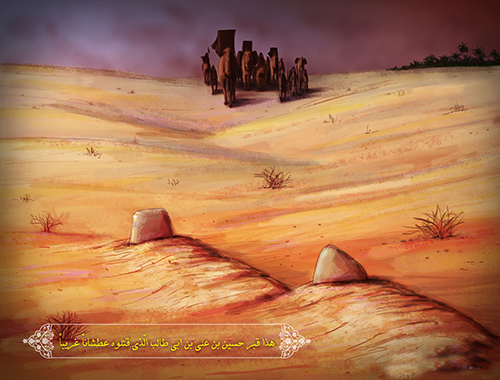2. Political Circumstances of His Imamate
- Details
- Hits: 1823
2. Political Circumstances of His Imamate
Imam ar-Ridha (a.s.) became the Imam at the age of thirtyfive, through Divine Command and the decree of his forefathers. The period of his imamate coincided with the caliphate of HÄrun and then his sons Amin and Ma’mun.
HÄrun had appointed Amin as his successor with the condition that the latter would name his brother, Ma’mun, as his successor. But after the death of HÄrun in 194, Amin named his own son, Musa, as his successor. This became a cause of conflict between the brothers which led to bloody wars and finally the assasination of Amin in 198, after which Ma’mun became caliph. Imam ar-Ridha took advantage of this chaotic situation and continued the tradition of his forefathers in educating and teaching his companions and followers.
Until that day the policy of the ‘AbbÄsid caliphate toward the Shi‘ites had been increasingly harsh and cruel. Every once in a while one of the supporters of ‘AlÄ« would revolt, causing bloody wars and rebellions which were of great difficulty and consequence for the caliphate.
The Shi‘ite Imams would not cooperate with those who carried out these rebellions and would not interfere with their affairs. The Shi‘ites of that day, who comprised a considerable population, continued to consider the Imams as their religious leaders to whom obedience was obligatory and believed in them as the real caliphs of the Holy Prophet. They considered the caliphate to be far from the sacred authority of their Imams, for the caliphate had come to seem more like the courts of the Persian kings and Roman emperors, and was being run by a group of people more interested in worldly rule than in the strict application of religious principles. The continuation of such a situation was dangerous for the structure of the caliphate and was a serious threat to it.
Ma’mun thought of finding a new solution for these difficulties which the seventy-year old policy of his ‘AbbÄsid predecessors had not been able to solve. To accomplish this end he adopted some pro-Shi‘ite policies:
he openly used to say that Imam ‘Ali bin Abi TÄlib was better suited for caliphate than Abu Bakr or ‘Umar ibn KhattÄb.
he openly used to curse Mu‘Äwiya bin Abi SufyÄn.
he gave Fadak back to the descendants of ‘Ali and FÄtima.
he chose Imam ‘Ali ar-Ridha as his successor, hoping in this way to overcome two difficulties: first of all to prevent the descendants of the Prophet from rebelling against the government since they would be involved in the government themselves, and secondly, to cause the people to lose their spiritual belief and inner attachment to the Imams. This would be accomplished by having the Imams become engrossed in worldly matters and politics itself, which had always been considered by the Shi‘ites to be evil and impure. In this way their religious organization would crumble and they would no longer present any danger to the caliphate. Obviously, after accomplishing these ends, the removal of the Imam would present no difficulties to the ‘AbbÄsids.











